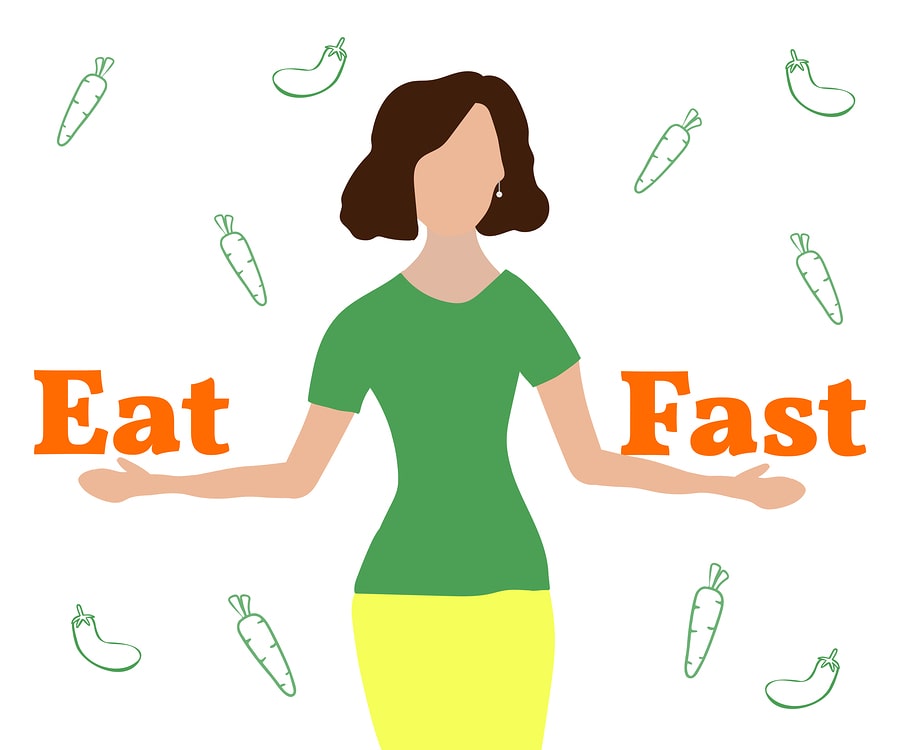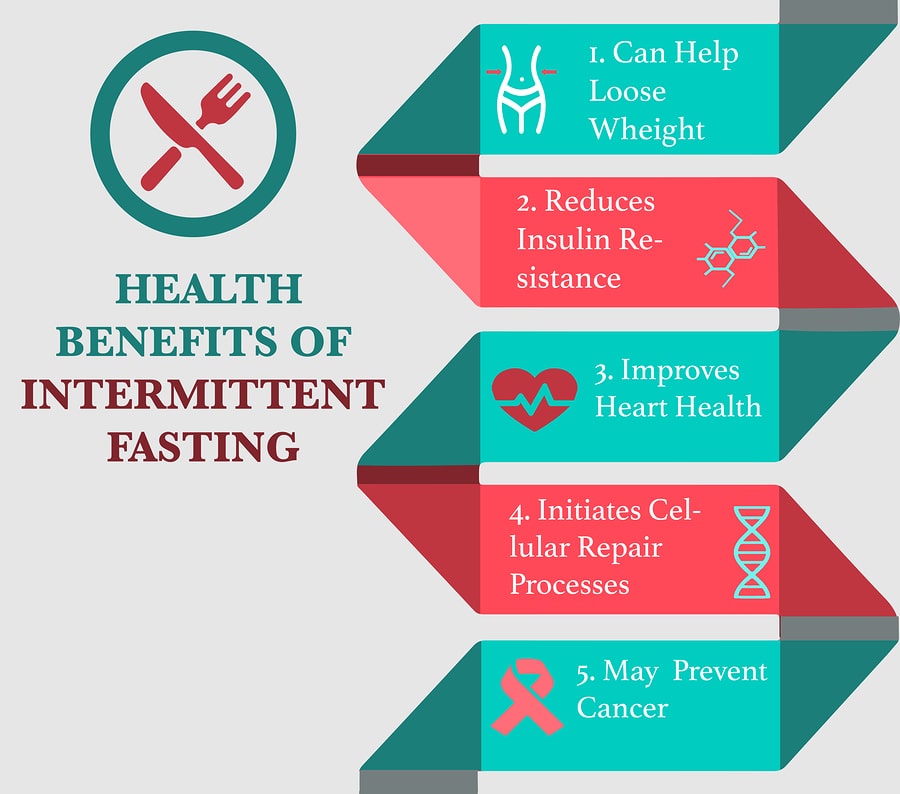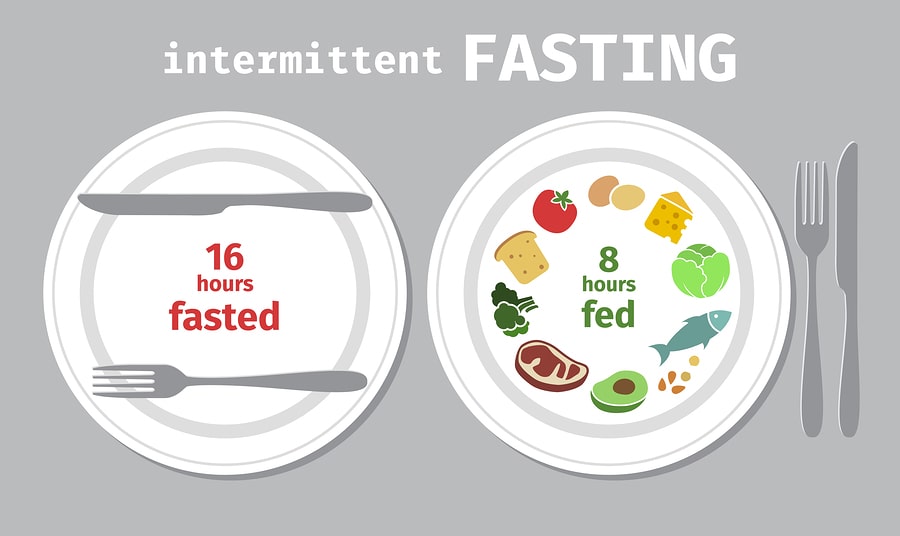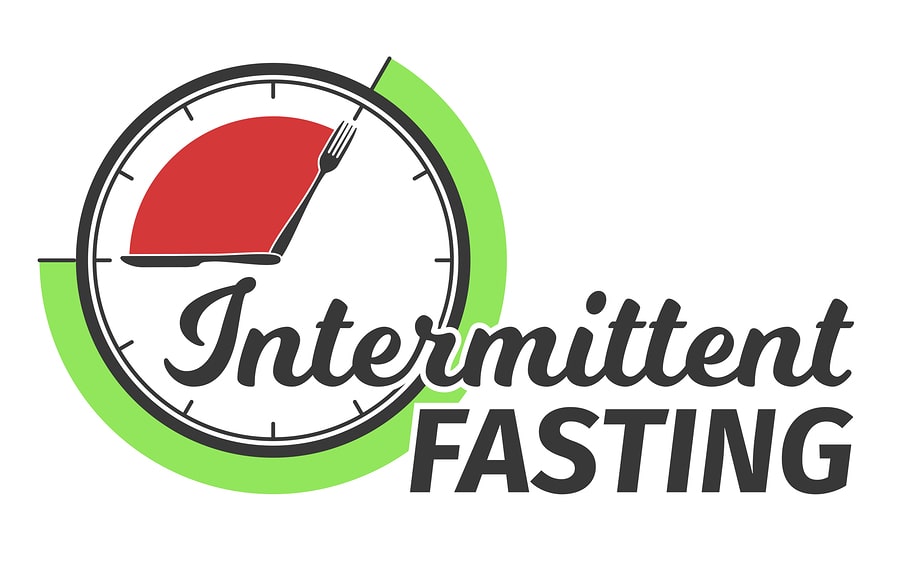Intermittent fasting is so intriguing because it is actually referenced in the Bible a fair amount of times. In Biblical times people fasted in times of prayer, when they needed to feel a close personal relationship with God, or when they needed to make serious decisions. But, does intermittent fasting help you lose weight?
The answer is a resounding YES.
Here we share what intermittent is, how it can help you lose weight and other health benefits you can expect, and how to get started.
Today people fast for one of two reasons. They either want to lose weight or because they understand that it helps to heal and rejuvenate the body.
Fasting goes back thousands of years. It has phenomenal benefits like weight loss, more energy, reversing diabetes, and much more. The best part is, it doesn't need any time and certainly no money. It's just a natural part of life.
What is Intermittent Fasting?
Intermittent fasting is a broad term that means that from time to time you don’t eat. Usually, the fasting time is 12 hours or longer.
People ask, “But, isn’t that starving yourself?”
No, not at all. Fasting is different.
Starvation is when you are involuntarily deprived of food for an ongoing time. Whereas, with fasting, you voluntarily decide not to take in food, be it for health or for spiritual reasons. You are choosing not to eat when you fast and it can last for hours, for days, for weeks, and even months – it is at your will.
In fact, any time you don’t eat, you are actually fasting. That is where the word “breakfast” comes from – to break your fast, which you do on a daily basis. Fasting a part of our everyday lives, but today, we have forgotten what a powerful and therapeutic tool intermittent fasting is.
Does Intermittent Fasting Help You Lose Weight?
How It Works


At the very foundation, fasting is about your body burning off excess body fat. If you have body fat, you have food energy that is in storage. Then when you don’t eat, your body starts to ‘eat’ at the fat to get the energy it needs.
Because our lives are all about balance, the same applies to our bodies – eating and fasting keep the balance.
We humans sometimes ingest more food than can immediately be used for energy. Sometimes that energy gets stored as fat, to be used later.
The key hormone in our body for the storage of food energy is insulin.
As you eat food and increase the insulin levels in your body, so you store sugar which is converted to fat. This fat is often stored in your liver but can also be sent to other fat-depositing places in your body.
We have two storage systems in the body for energy – glycogen and body fat. When you don’t eat, the above process goes into reverse. So instead of insulin levels rising, they now fall. This tells the body to start burning up the stored energy as no food is coming it's way.
Our bodies are constantly in two states, the fed state, or the fasted state. We are either storing food for energy or burning it.
If we started to eat food the minute we got out of bed in the morning and continued to eat until we went to bed again at night, our bodies would spend all the time in the “fed” state. We would gain weight because we didn't allow our body to burn any of that food into energy.
To lose weight, we need to spend some time fasting because it allows the body to use up that stored energy. Our bodies are designed to work like that.
Look at dogs, cats, and wild animals; that is what they do. If we constantly eat as sometimes it is recommended, our bodies don’t get around to burning the body fat, instead; we will just store it.
Besides Weight Loss What Are the Other Benefits to Intermittent Fasting?

- The body detoxifies and gets rid of toxins
- Mental clarity and improved concentration
- Increases growth hormones
- Longevity – Fasting helps you live longer
- Reduced blood sugar and insulin levels
- Helps to reverse Diabetes type 2
- You'll experience more energy
- Lowers cholesterol
- Lowers your risk of Alzheimer's
- Fasting stimulates autophagy
- Reduced Inflammation in the body
Diets Can Complicate Your Life
Fasting Can Simplify It
When you start a diet, you need to go out and buy all the ‘right’ foods and ingredients, but fasting is free! Dieting can take time, but fasting saves you time. Diets offer you a limited type of eating whereas fasting can be done anywhere, any time.
There are short fasts that last up to about 16 hours and then there are the longer fasts that last well over 24 hours. Those who go on the shorter fasts do them more frequently than if they went on a long fast.

The 16-Hour Fast
This is where you eat your meals within an 8-hour period, leaving the other 16 hours to fast.
The 24 Hour Fast
This involves fasting from lunch on one day to lunch to the next day, or from supper to supper. For instance, you eat your lunch today, you skip your dinner and also your breakfast the next day, eating only again at lunchtime. When you eat only once in a day, it equates to eating around 3 times a week.
The 48-Hour Fast
On this diet, you eat normally for 5 consecutive days, and then you fast for 2 days. On the 2 fasting days, you are ‘allowed’ to eat up to 500 calories on each of the days, any time, and spread out or eat in one meal. This fasting method was made popular by Dr. Mosley in his book called ‘The Fast Diet.
The 36-Hour Fast
Here you eat your dinner on the first day, on your second day you fast and on the third day, you eat breakfast. That makes 36 hours of fasting.
Longer Fasting Periods
Want to know the longest fast ever? 382 days. So if you believe that doing a fast lasting around 7-14 days is impossible for you, think again!
Yet, there are certain people who should not really fast for longer than 14 days because it is possible that after the fast, they get complications.
You Shouldn’t Fast for the Following Reasons:
- If you are underweight and you’re BMI (body mass index) is under 18.5.
- If you are pregnant – because your baby needs all the nutrients it can get and also if you are breastfeeding.
- If you are under 18 because you need the nutrients for growing.
If you want to fast but have any of these conditions, check with your doctor in these instances:
- If you have diabetes Type 1 or 2
- If you use prescription medication
- If you have high uric acid in your body or suffer from gout. If you don’t get the necessary nutrients you could experience fatigue, constipation, dizziness and a hike in your uric acid levels
What About Women Fasting?
Women ask if it is okay for them to fast because studies show that intermittent fasting in female rats made them more masculine, emaciated, and infertile, causing them to miss their normal cycles.
These cycles are the estrous cycles where the endometrium is totally reabsorbed by the animal at the end of the reproductive cycle.
Some women report their menstrual periods stop when doing intermittent fasting, but return back to normal when they stopped fasting. It is for this reason women should be careful with intermittent fasting.
If you have problems with amenorrhea, stop fasting right away. Amenorrhea is the name for when women experience abnormal absences of menstruation.
If you suffer from fertility problems and you are trying t get pregnant, hold off intermittent fasting for now.
What About Exercising While Fasting?

It is a good idea to continue exercising like you usually do while you fast. Food is not necessary to provide enough energy for doing exercises. You will be burning fat more than ever for the energy needed.
When you fast, your human growth hormones will go up and the insulin levels will go down. Fat burning hormones increase, actually increasing metabolic rates by around 3.6-14%. There is a study that shows that intermittent fasting actually causes less muscle loss than some standard methods of dieting or calorie restriction.
Keep in mind though that the main reason intermittent fasting works is that you do take in fewer calories. This means that if you eat more or binge in your eating periods, you are not likely to lose weight at all.
Are There Any Side Effects When Intermittent Fasting?
It is possible that some people will experience some side effects while you are fasting. Let’s look at what they are:
- Headaches
- Constipation
- Dizziness
- Muscle cramps
- Heartburn
Some experts note that you can’t just go from being a couch potato to an athlete overnight because the body doesn't like extreme changes.
It makes sense to experience side effects when you stop eating all of a sudden over extended periods of time.
The side effects might seem impossible or unbearable to deal with at the beginning. But if you know how to cope with it, you will find yourself able to stay with intermittent fasting and reap the remarkable benefits.
How To Cope With Hunger While Intermittent Fasting
When you fast, the hunger pangs pass. Many people fret that they can't fast because hunger will be too hard to manage. You will experience waves of hunger, but if you choose to ignore it and drink a cup of tea or coffee, it usually passes.
When fasting, water, tea and coffee are fine, and other non-calorie beverages as well. Preferably you won't be adding sugar to your tea and coffee; adding some milk or cream is okay. In fact, Coffee can be quite beneficial to you when you are fasting because it can blunt the hunger pangs.
If you undergo an extended fast, hunger can usually increase in the beginning but gradually recedes so that by days 3 and four you are not really hungry at all. It is because your body is being driven by the fat, kind of like ‘eating’ the fat on your body.
The good news is, muscle does not waste away.
When you fast, your body is breaking down glycogen, turning it into glucose for the energy it needs. The body doesn’t burn its muscles to get the necessary fuels to operate.
Fasting is not a new fact; it has been around and practiced for thousands of years and never are there any records of any muscle loss during fasting.
If you want to try intermittent fasting, here are a couple of tips to help you along the way:
- Keep on drinking water to stay hydrated
- Keep busy so that you are not concentrating on your fasting as much
- Drink coffee or tea to help you ride out the pangs of hunger
- Don’t let people know you are fasting if you know they will be disapproving
- Time yourself – give yourself a goal, like a month
- In between fasting periods, follow the low-carb diet because this kind of eating reduces your hunger and makes the whole fasting process easier.
Remember – don’t binge after fasting! This is very important.
The way to break a fast is to start gently. The longer you were on the fast, the more gently you need to introduce foods to your body.
If you have been on short fasts and then eat a huge meal afterward, you will end up with indigestion, which is not serious but unpleasant. You'll want to break your fast gently after a fast.
Can’t I Just Reduce Calories – isn’t that the same as fasting?
No, it's not.
Fasting is reducing the time you eat and calorie reduction is deciding what to eat and when. They are really two different decisions and issues, not to be confused. Yes, sure, fasting does reduce calorie intake but it has benefits to your body that reducing calories does not offer.
So, how do you get started with intermittent fasting to lose weight?
- You need to decide how long you want to fast.
- If you have any medical concerns, check with your medical doctor.
- If you want to continue with your usual way of life while fasting, check to make sure you don't have too many commitments.
- Remember when you to break your fast, do it gently
Remember, fasting is not “dieting”. You could better describe it as an eating pattern.
Realize that fasting came about because ancient people did not have grocery stores to buy food or refrigerators to store food. Often they had to function without food for extended periods of time.
In fact, the Bushmen people of Southern Africa still follow that ancient way of living to this day.
They often endure long walking stretches or even running to find food, carrying it on their backs to their abodes.
You never really see “obese” Bushmen because their bodies are “ripped”, lean, and in the right proportions. Their lifestyle does not stimulate the massive muscle growth sought after by people today, beyond what the body requires. Their energy goes towards maintaining their strength, their endurance, and their tenacity.
It’s that simple
A real major benefit of intermittent fasting is that if you are a healthy eater and watch your diet and weight, it makes your healthy eating lifestyle even simpler – fewer meals to prepare and cooking and cleaning up afterward.
Most intermittent fasting plans don’t tell you what to eat; they rather tell you when to eat, making them very customizable.
So if you want to eat a high-protein diet, then you can and if you want to eat a moderate-carbohydrate plan, you can do that too. Maybe you want to rather go for eating less processed food, which you can do too.
It doesn’t mean to say that it doesn’t matter what you eat. Naturally, common sense will tell you that it is a good practice to get good nutrients into your body. This should be your practice when you are intermittent fasting.
Does Intermittent Fasting Help You Lose Weight Conclusion
When you fast intermittently, you will lose weight by using an uncomplicated and stress-free style of eating. You will experience all the benefits mentioned here while reducing the amount of time you stress about what you should or should not be eating.
That said, the best diet for you is the one you can stick to and which benefits you and your health in the long run. Intermittent fasting certainly is ideal for some people, while not for others.
Find out for yourself whether it's right for you or not. but it sure seems to have had its benefits on those who lived in ancient times.
Don’t gain weight by ‘snackcident’ – by not worrying about overeating and eating the wrong foods. Give your body a break – it deserves to be looked after to the best of your ability so that you can reap the benefits that intermittent fasting brings – try it yourself – it is certainly a powerful tool for healing and vibrant healthy living. Does Intermittent Fasting help you lose weight? YES!

Related Content:



